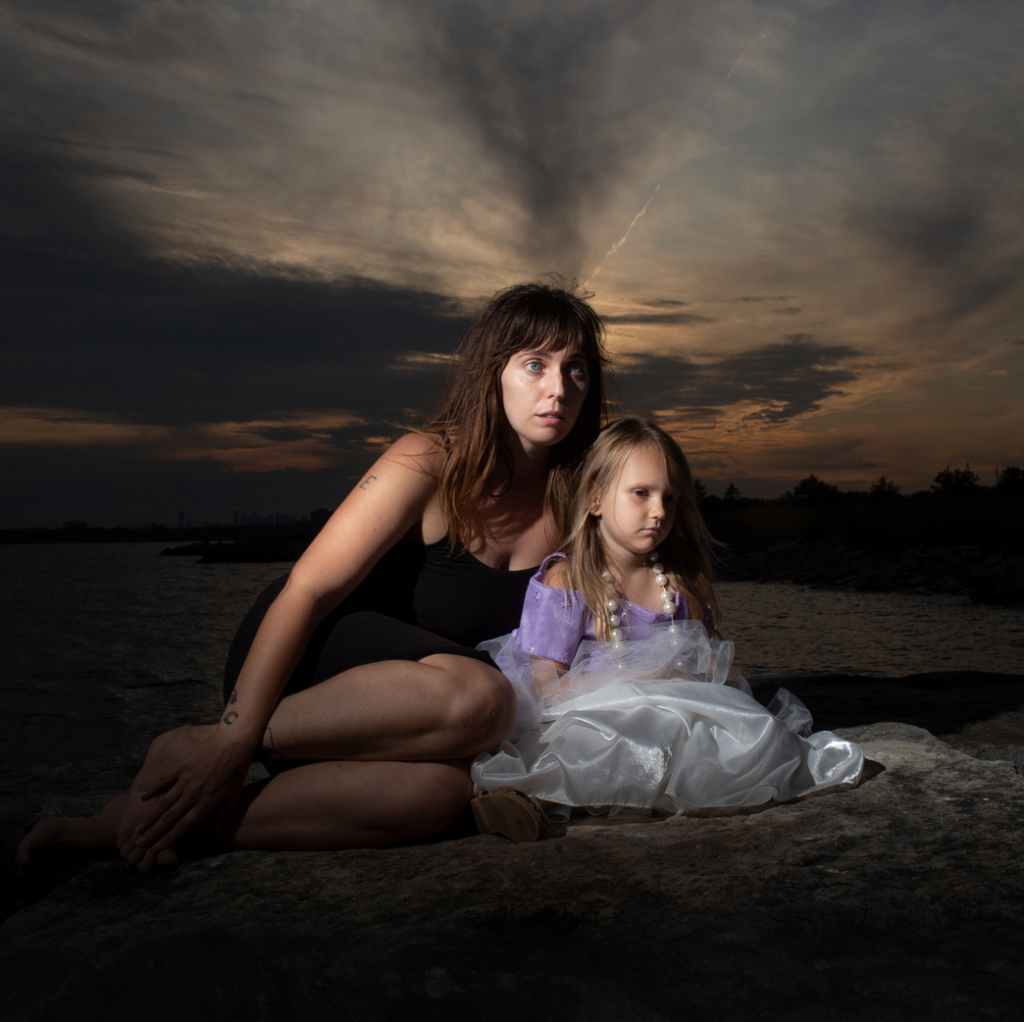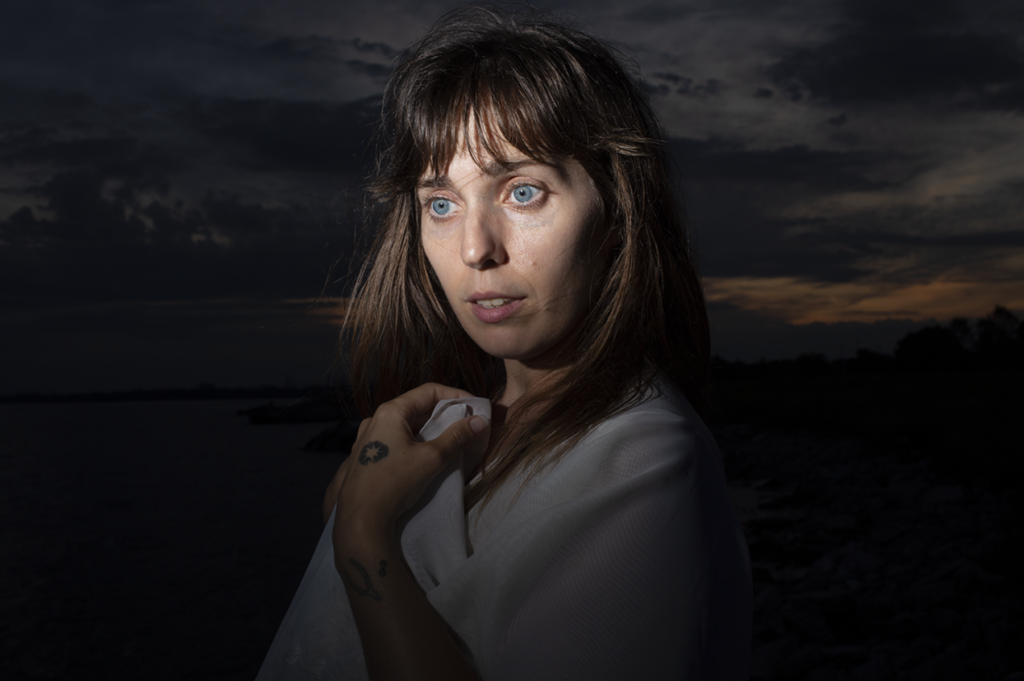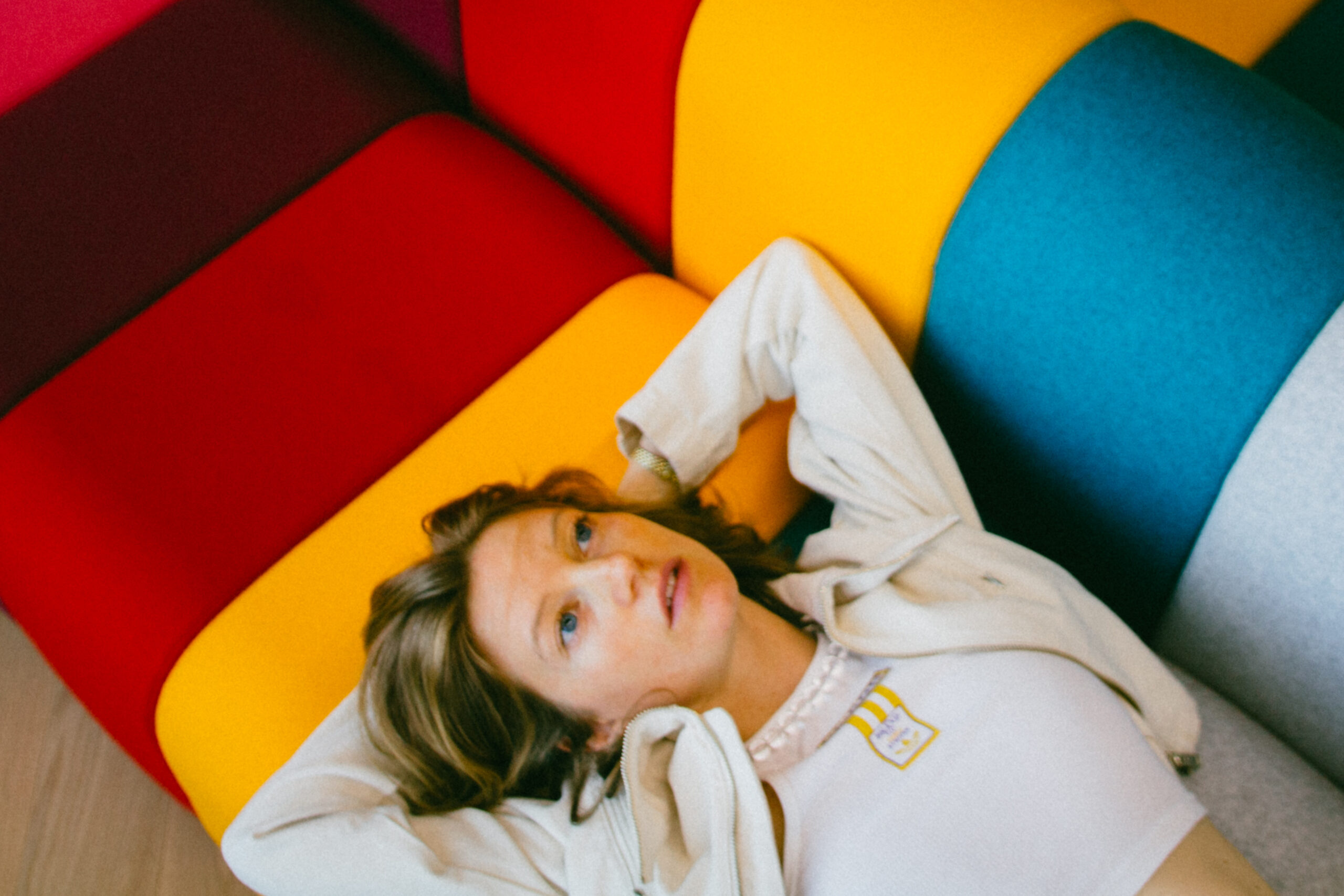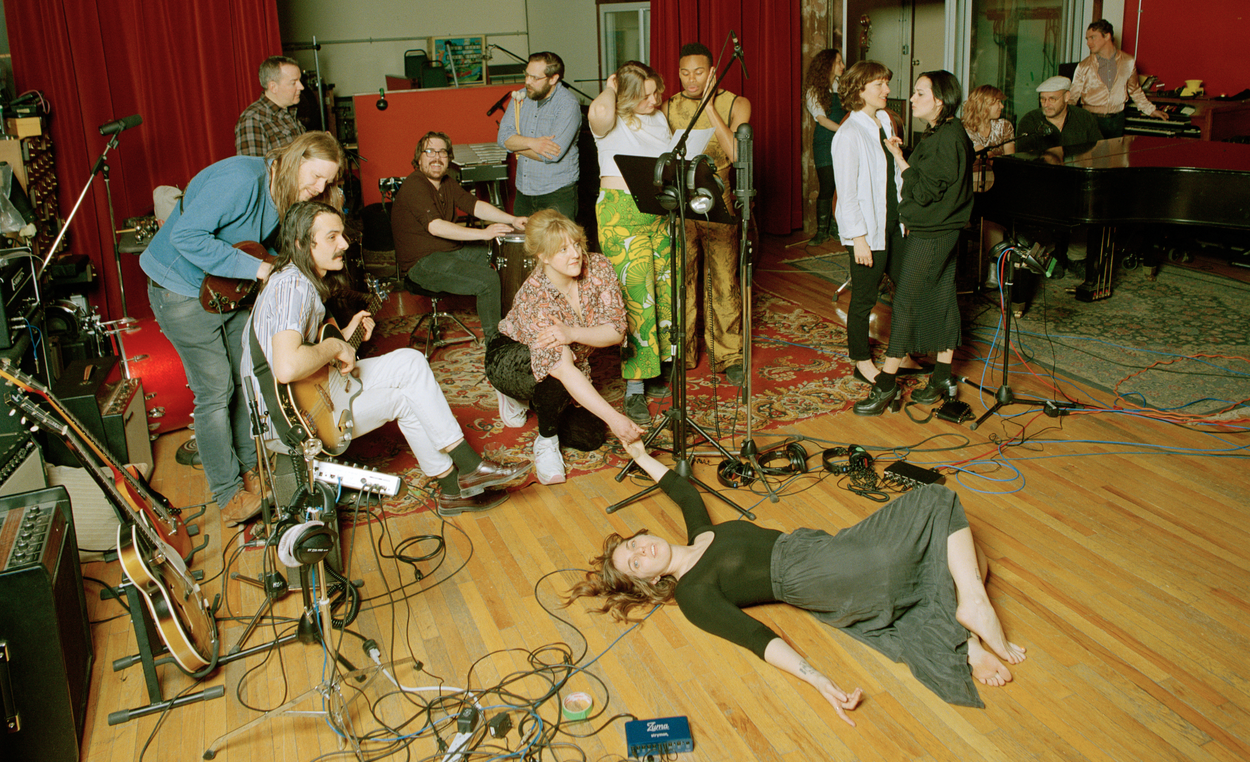Foto-© Colin Medley
Vor 10 Jahren veröffentlichte Meghan Remy Red Ford Radio, ein 4-Spur-Track, der an verrauschte Radioübertragung erinnerte. Nun findet sich dieser Song in einer neuen Version auf dem U.S. Girls Album Heavy Light wieder, das am 06. März bei 4AD erscheint. Für Remy schließt sich nach einer Dekade damit ein Kreis. War U.S. Girls am Anfang noch ein Bedroom-Projekt, das mit einfachsten Mitteln entstand, so ist das neue Album mit 20 MusikerInnen in den Hotel 2 Tango-Studios in Montreal entstanden. Bereits mit der Vorgängerplatte In A Poem Unlimited zeigte die Kanadierin ihr stilsicheres Händchen für opulente Melodien und wurde auf der anschließenden Tour von sieben MusikerInnen begleitet – ein ehemaliges Soloprojekt wuchs damit zu einer richtigen Band an.
Wir haben im Anfang Februar mit Remy telefoniert und über Heavy Light und ihre Rolle als Künstlerin gesprochen. Im Interview erzählt sie uns, warum sie bei der Veröffentlichung einer Platte eigentlich schon bei der nächsten ist, welche große Rolle Literatur in ihrem Leben und für ihre Arbeit spielt und warum sie die Menschen, erst einmal nach Persönlichkeit auswählt. Außerdem erfahren wir, welchen fundamentalen Einfluss ein Umzug nach Toronto und ihre Gesangsausbildung auf ihr Schaffen hatten und warum es trotzdem spannend ist, dem früheren Selbst einen Besuch abzustatten.

Your new album Heavy Light comes out in March. With the release date getting closer, how do you feel about sharing it with the world after a long working process?
It’s hard, because for me the meaning that I get out of making a record is making the record. It’s not really the putting it out. It’s kind of an event that’s over for me at this point. That’s the opposite of the reality. What’s happening for me now is building the live show. It’s related to the record, but it’s also a complete separate entity, it’s a different beast entirely. I’m focused on that, so it’s a lot of work right now, sorting things out, taking risks, figuring out what we want the show to be. I’m in hyper-focused work mode.
Does that mean you already think of the next record when putting a new album out?
Yes, I’m already writing the next one.
Even though you’re very ahead of us listeners with new songs already in mind, playing the songs of the album live must still feel new somehow?
It does. It’s so different than the record is. It will be slightly different musicians and recording is different than standing in front of people. It’s different points you need to hit. Live is so physical, it involves your body in a different way. I like it, because people that come to the show might be familiar with the work, but they could never be familiar with what the performance will be. It’s different every night. It’s not only new for them, it’s also new for me every night. That’s why I like performing. There’s a spontaneity to it that’s great.
You recorded Heavy Light with 20 musicians, are you taking a big band on tour as well?
I wish, that would be the dream! Unfortunately, I’m only able to bring eight people.
That’s still a lot!
It’s eight people doing many things at once – eight people mimicking 20. A lot of people are using their hands and their feet, we’re using our entire bodies to make it work. It’s such a privilege to be able to bring eight people. It’s hard logistically and moneywise. I toured with eight people for the last record as well and it’s something that people don’t see anymore. They’re used to maybe a four-piece band or someone with a laptop. I can remember that young people came up to me saying that they’ve never seen a saxophone before.
You started out as a one-woman project, now you’re touring with eight people, you’ve recorded with 20 other musicians. Has that always been the vision for U.S. Girls or did it happen with the evolution of your sound?
For me, a big thing was moving to Toronto. I got introduced to a new group of people and it happened to be some crazy talented musicians, who knew a bunch of other really talented musicians. I slowly started getting to know those people and that corresponded with me taking vocal lessons. I never wanted to work with other musicians before, because I didn’t think that I was talented enough. I was embarrassed to say that I don’t even play an instrument. It was a matter of getting a bit of confidence. But it was also my vision growing to a point where I couldn’t do it anymore on my own. I needed to ask for help. It evolved into that. If I’m looking back on 13 years ago, when I started this, I would have never dreamed that this is where I end up. But I’m grateful that I had the opportunity to evolve as an artist and to do this. It could have just ended with me making tape records.
For Heavy Light you not only recorded with various musicians, but also wrote with other people like Basia Bulat und Rich Morel. How did that happen and how do we have to imagine the process?
It was different with each person. Rich Morel, who also worked with me on some songs for the last record, and I live far apart from each other. When we decided we wanted to write together, I talked to him about the vibe I was looking for, the instruments I was going to use and dictated to him that we’re going to record it all live. And he went to his studio messing around with some stuff and sent me a batch of instrumentals. I picked the ones I liked and started writing to them. Then, I visited him, we made fancier demos of the songs and talked about arrangements. We gave them to the musicians and the musicians played them. With my friend Basia, it was a different story. That’s me writing vocally, taking the songs to her, singing them to her, asking her, “do you like this chord, do you like that chord,…”, and taking it from there. I’ve never had one way that I work in terms of writing. However a song comes out, it comes out.

Talking about inspirations, I found it quite surprising that you name Bruce Springsteen as one big influence. Can you tell us more about your fascination with his music?
It is something that came from my family, they loved him. For me, it was his lyrical content. He was writing about average, mundane things. It wasn’t flashy, it wasn’t about rich people. I liked that, I related to it. I like story songs that sound like they almost have real dialogue in them. Like a song that could be made into a movie. And he has that. I think he also have been influenced by artists that I love, too. The 50s and 60s R&B, rock’n’roll and country music. I love all that music. I think he really wears his influences on his sleeve while still being himself. I’m also interested in him from the fact that he writes in a kind of character that isn’t him at all. He’s actually one of the richest musicians. His methodology in general is very interesting. I also think it’s very funny.
Can you relate to the writing from different roles other than yourself? Is that something that you do?
For sure, I did that a lot for my previous record. I was writing from a character’s perspective. That’s a shift on this one, I’m emotionally writing from myself.
For Heavy Light you also revisited some of your old songs — how was it to come back to your old material and why did you want to record new versions?
There are a lot of reasons for that. I wanted the record to be percussion and vocal based, which is how I originally started making records. I went back to those songs and thought if there was anything that I want to be able to sing better. I was taking vocal lessons in 2014 and my ability now is like night and day. Getting to re-sing those songs as an older person, as a person with training, is a great exercise for me. To see that I wrote those songs a long time ago with no training and it doesn’t matter, they’re still good songs, they still can be done. I think also that a lot of people don’t really know about my work from before Half Free. It’s a little bit of a signal to people that I have a large catalogue and if curious you can go back through it. It’s a fascinating journey, if you reverse engineer it and go back.
How does it feel you visit your younger musical self and take it into the present?
It’s like I’m traveling back in time and I’m also proud of myself. And I’m proud that I stuck with this thing that I love. I didn’t really let anybody tell me how to do it, I always did my own thing and when I go back to the early stuff that really makes me grin. I didn’t know what the hell I was doing, and it didn’t matter. I was expressing myself, because I felt that I needed to, and I wanted to. I can’t believe how bold I was. And I’m still that person and I can still feel that person inside of me.
Talking about the need to express yourself, what inspires you while writing?
With this record in particular and in the past few years, the number of books I read went through the roof. It’s kind of a personal school of reading and note taking that I’m putting myself through. A lot of the things I’ve been reading have been about colonialism and patriarchy. Those things affected how I wrote and why I wrote. But probably the main thing would be being in a pretty intense process and it’s giving me a lot of answer, but also posed way more questions.

Your album title was inspired by Franz Kafka, do you take motives from literature for your work or do you find your work in literature?
There is nothing that is more satisfying than when you read a book and it contains what you’ve been thinking or how you’ve been feeling. You know you’re not alone. And even better, when the book is hundreds of years old and you realize your not the only one, this is an old feeling, this a human feeling. I can get through this, this is okay. Also, a lot of times in the past I’ve taken lines from books and put them in the songs or characters that I fell in love with and decided to try and write from their perspective. On my first record with 4AD there’s song called Sororal Feelings that’s based on a character from a Michael Ondaatje novel. It’s a woman who finds out that her partner slept with all her sisters. It’s a very small character in the book, it was a great exercise for me to meditate on her. What that would feel like, what her voice would sound like…
This process of relating that you described with literature, do you sometimes picture people having that with your music and is that a motivation for you or are you just with yourself whilst working?
It’s both. I do a lot of work and research and I can see the benefit of digging into yourself and into your past. Sometimes people don’t even know that’s a possibility and that’s a good thing to do. I’m lucky enough to be an artist and I have a lot of free time. I use my free time wisely and I make these things that are summaries of my research and when I put them out there, it’s in the hopes that people won’t have to do so much work, I’ve done it for them. I hopefully distilled it down to a version that jumpstarts their curiosity. I want to be useful in this world, I don’t want to do things just to feed my ego. I want to be a tool for people and a tool for myself.
Can it also be hard being a tool for people’s imaginations and projections?
I don’t really see what people say about me. I have a hard line about not reading my press. It’s something I’ve been able to stick to. I’m too sensitive for it and I don’t want it to affect anything I say, to change what I’m saying for fear that my words are going to get twisted. That happens and I can’t control what people are going to write. I’ve grown into that the only people I care what they think are the people I love. Anyone else – they don’t know me. I try not to think too much about that.
Are you trying to take that into your work environment, too? How do you pick the people you work with?
A big part of it is, who the person is themselves, if they’re kind. The secondary is if they’re good musicians. I don’t care how good the person is, if they’re an asshole, I don’t want to work with them. I try to work with gentle people, with people with a sense of humor, who are sensitive as well. People who are excited by music and performing and who are interested in pushing the boundaries of performance and aren’t scared of that. I don’t make a ton of money, but my show is a big show with a lot of expenses, I need people that are willing to take some sacrifices in order to put it on. Sharing beds in hotel rooms, traveling in a cramped van, maybe not getting paid as much as they could if they were working with a smaller but more successful band. I want to work with people that understand that the best currency of getting paid in is experience and a communal effort and growing as a person and performer. Those are the things I really look for. Going on the road it will be four guys and four women and our tour manager is a woman, too. I’ve never travelled with five women before and I’m really looking forward to that. I feel so comforted by the fact to be with women that are going to understand when I have my period.
Do you think times are finally changing for women in the music industry?
I don’t think the music industry is changing, it’s how you choose to navigate it. I try to navigate it very intentionally. I try to separate music from the music industry as much as possible. I don’t think the industry is changing, because I don’t think it can. It is what it is, it’s a capitalist thing.
Thank you for the interview!










